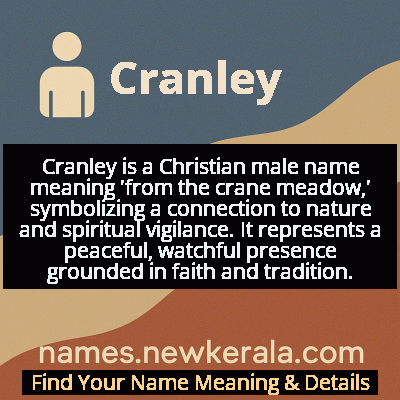Cranley Name Meaning & Details
Origin, Popularity, Numerology Analysis & Name Meaning of Cranley
Discover the origin, meaning, and cultural significance of the name CRANLEY. Delve into its historical roots and explore the lasting impact it has had on communities and traditions.
Name
Cranley
Gender
Male
Origin
Christian
Lucky Number
6
Meaning of the Name - Cranley
Cranley is a Christian male name meaning 'from the crane meadow,' symbolizing a connection to nature and spiritual vigilance. It represents a peaceful, watchful presence grounded in faith and tradition.
Cranley - Complete Numerology Analysis
Your Numerology Number
Based on Pythagorean Numerology System
Ruling Planet
Venus
Positive Nature
Harmonious, responsible, caring, and artistic.
Negative Traits
Overly idealistic, superficial, possessive, or jealous.
Lucky Colours
Pink, turquoise.
Lucky Days
Friday.
Lucky Stones
Diamond, turquoise.
Harmony Numbers
2, 3, 9.
Best Suited Professions
Artists, musicians, teachers, healthcare workers.
What People Like About You
Warmth, nurturing nature, artistic flair.
Famous People Named Cranley
Cranley Onslow
British Politician
Conservative MP and Minister of State for Foreign Affairs
Cranley Douglas
Australian Cricketer
Prominent early Australian cricketer and sports administrator
Cranley Foulkes
Military Officer
British Army officer and author on military engineering
Cranley Heathcote
Clergyman
Anglican priest and academic at Cambridge University
Name Variations & International Equivalents
Click on blue names to explore their detailed meanings. Gray names with will be available soon.
Cultural & Historical Significance
The name's Christian heritage is further emphasized by its use in religious communities and its appearance in church records throughout English history. The crane bird itself holds symbolic meaning in Christian iconography, often representing vigilance and spiritual devotion. This combination of geographical origin and religious symbolism made Cranley an appropriate choice for Christian families seeking a name that connected their child to both their earthly heritage and spiritual values. The name's persistence through centuries demonstrates its enduring appeal within Christian naming traditions that value both historical continuity and natural symbolism.
Extended Personality Analysis
Individuals named Cranley are often perceived as grounded and observant, reflecting the name's connection to natural landscapes and wildlife. They tend to possess a calm, methodical approach to life, much like the graceful crane moving through its meadow habitat. These individuals typically demonstrate strong loyalty to family and tradition, valuing stability and continuity in their personal and professional relationships. Their observational skills often make them excellent judges of character and situations, allowing them to navigate complex social dynamics with wisdom and discretion.
Cranleys are frequently described as having a blend of practical wisdom and spiritual depth. They approach challenges with patience and deliberation, rarely making impulsive decisions. Their connection to the name's natural origins often manifests in an appreciation for nature, conservation, or outdoor activities. While they may appear reserved initially, they form deep, meaningful connections with those they trust and are known for their reliability and steadfastness in times of need. The combination of crane symbolism (representing vigilance and grace) with meadow symbolism (representing peace and fertility) creates a personality profile that balances watchful intelligence with nurturing stability.
Modern Usage & Popularity
In contemporary times, Cranley remains a relatively uncommon but distinguished choice for boys, primarily used in English-speaking countries with strong British heritage connections. The name has seen modest usage among families seeking traditional English names that are distinctive without being overly unusual. While not appearing on popular baby name charts, Cranley maintains a steady presence in Christian communities that value names with historical depth and natural symbolism. Its usage has seen a slight increase in recent years as part of the trend toward surname-style first names and nature-inspired appellations, particularly among parents looking for names that honor family heritage while providing a unique identity. The name's rarity ensures it stands out while its traditional roots provide a sense of established dignity.
Symbolic & Spiritual Meanings
Symbolically, Cranley represents the harmonious intersection of earth and sky, with the crane symbolizing spiritual aspiration and the meadow representing groundedness and fertility. The crane has long been associated with vigilance, longevity, and spiritual messenger qualities across various cultures, while meadows symbolize abundance, peace, and natural beauty. Together, these elements create a name that embodies balance between practical earthly concerns and higher spiritual pursuits. In Christian symbolism, the combination suggests a life lived in accordance with divine creation, where one remains attentive to God's guidance while being firmly rooted in the physical world. The name carries connotations of watchful protection, graceful strength, and the ability to find spiritual meaning in everyday life, making it a powerful symbolic choice for those valuing both tradition and spiritual depth.

